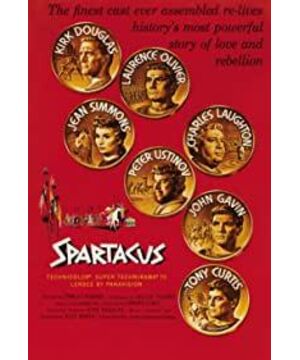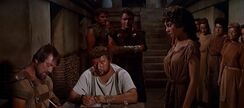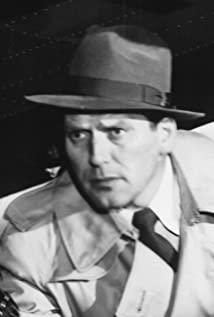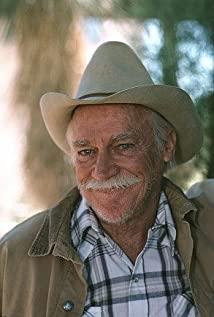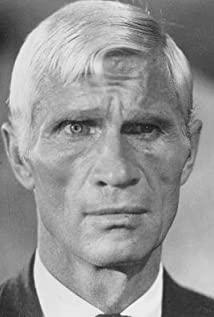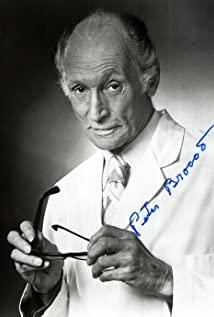http://qfmeng.blogbus.com/logs/169706268.html
Spartacus (1960)
This is a large-scale epic film that records The life of Spartacus, which lasted 198 minutes, was very hard to watch. This film is also directed by Stanley Kubrick. He is really versatile and can make any kind of film.
The story of the movie is generally narrated according to historical data, and some plots do not follow historical facts in order to increase the focus, especially the plot about Varinia. The movie begins when Spartacus is bought by the owner of the gladiator training facility. After he came to the training center, he met Varinia, the first woman in his life, and the two fell in love at the training center. Crassus, a Roman general, and his relatives and friends passed by the training camp when they were visiting, and wanted to see the gladiators fighting. During the conversation, Crassus took a fancy to Varinia and bought her from the owner of the training house. The next day, Spartacus was angry when he found out that his sweetheart had been bought by Crassus, and attacked the guards angrily. At this time, other gladiators joined the fight, and the conflict gradually turned into a riot. The gladiators occupied the training facility, and at the suggestion of Spartacus, the gladiators decided to sail south to leave Italy. On the way, Spartacus met Varinia, who had escaped from the owner of the training center, and the two were finally together. As the team progressed, more and more people followed Spartacus, and all the troops sent by Rome were defeated one by one, and even the troops of Crassus' friends were defeated. Seeing this scene, Crassus resigned from his position temporarily. Spartacus is about to reach the port, only to find that everything planned has changed, and they can only fight for Rome. It turned out that this was Crassus' trick: he bought the ships to transport Spartacus, and sent a large army to attack them, forcing Spartacus to march on Rome. Seeing Spartacus attack, in order to defend the Roman Senate, Crassus was appointed as the Roman consul, and he controlled everything. Crassus' plot was accomplished, and Crassus became a dictator. Later, Crassus' army and Spartacus' army experienced a great battle, Spartacus was defeated and himself captured. Crassus asked other captives to confess Spartacus. In order to protect him, the captives called themselves Spartacus. Crassus had to crucify all the captives. Crassus also found Varinia and Spartacus' children and brought them into his home. Crassus tried to get Varinia's love, but he tried all kinds of tricks to no avail. Angry Crassus later recognizes Spartacus, asks him to duel with his friend, wins will be crucified. In the duel Spartacus won, and he was crucified. In the middle of the night, Crassus' nemesis sent someone to steal Varinia and the child, and arranged for them to leave. On the way to leave, Varinia burst into tears when she saw her beloved.
This film can be regarded as a history textbook, it records the life of Spartacus very seriously: from his birth to becoming a slave, from slave to becoming a gladiator, from gladiator to slave leader, until he is After being defeated, he was crucified. But rule out the death of Spartacus, because Spartacus actually died on the battlefield. The whole film tells the story step by step, every paragraph of Spartacus' life is involved, and the scene is very even. From the standpoint of understanding history, this film is worth watching. But it is also because of this - the film itself is too rudimentary, so that the whole film has nothing to watch, the plot is bland like boiled water, there is no flavor at all, and it obviously lacks strong contradictions or dramatic plot twists. Simply put, the film is not "good-looking". In the process of watching, although I didn't feel sleepy, I didn't have any point of view that attracted me to continue watching. The only thing that supported me was the firm belief of "I want to persevere". This film reminds me of "Ben-Hur". The two movies are both epic movies. "Ben-Hur" is much better than this film. At least it has ups and downs in the plot and can be attractive.
What makes this film different from history is the battle between Spartacus and Crassus over Varinia. Searching the internet, there is no information about the Spartacus woman. I can only think that the character of Varinia is made up, which also makes Spartacus the reason for the uprising: a war between two men over a woman. In this regard, the film's director began to falsify history. According to the description of the movie, Varinia is a stunner, Crassus likes her the first time he sees her, and so does Spartacus. Hence the chain of events that follow, such as the riots caused by Spartacus seeing Varinia leave training, to Crassus grabbing Varinia to get her love, and so on. Varinia was just a symbol of conquest for both of them. Even in the eyes of Spartacus, because Varinia was his first woman. The main plot of the movie is interspersed into Spartacus's life, completely to increase the focus of the movie, but it makes the movie itself a lot lower-how is Spartacus also a leader who led the largest slave uprising in history.
In addition, in addition to the fiction about Varinia, many of the plots about Roman politics in the film are also tampering with history. Caius Sempronius Gracchus and Marcus Licinius Crassus are indeed two real historical figures, but there is no intersection between them, and the cause of death is not as described in the movie, and Marcus Licinius Crassus did not cause a war for a woman. ! The above is what I learned from searching the Chinese information on the Internet. It is difficult for me to accept that the film director of this film made up history in order to guarantee the plot of the film and increase the point of view of the film. Fortunately, I checked some information, otherwise I was deceived by this film?
As for the theme that the film wants to express, it is the old Hollywood "fight for freedom". After watching too many Hollywood movies, I have become numb to these. Think carefully about mainstream Hollywood movies, aren't they all interpreting positive abstract words such as "ideal", "love", "friendship", "freedom", "faith", "friends and relatives"? No matter how meaningful and inspirational themes are, it will be tiresome to read too much. I am in this state now!
Lastly, the movie itself. Let's compare "Ben-Hur" with this film. From the picture, this film is not as good as it, at least in terms of momentum, scale and scenes. Moreover, "Ben-Hur" also has memorable scenes, such as the paragraph of the horse race. Looking back on this film, the only thing that left an impression on me was the scene where the steamer was used to attack, but that "War of the Century" only lasted a few minutes, which was too short! Objectively speaking, this film is not inferior to "Ben-Hur" in terms of number of people, scenes, and overall scale, but the pictures they present on the screen are not shocking at all, and they will not leave any impression on people. Hey, although Stanley Kubrick is a well-known director, this film is really average. The all-rounder Stanley Kubrick just made a passable film to ensure that the film is not a bad film. Even so, as a film released in 1960, this film can do so much, it is still worthy of admiration.
There are many superstars in this film, and I see a lot of people who are familiar. Kirk Douglas plays the male lead. He was already a big-name star in that era, but his performance in this film was mediocre, probably all the heroes were the same. Laurence Olivier plays the big villain Crassus, and the interpretation is very expressive, and there is indeed a kind of evil. Gracchus played by Charles Laughton is a political but kinder character. He has performed these two aspects perfectly. The old guy's acting skills are indeed extraordinary. Another supporting actor is Tony Curtis, who is superb in "Passionate", and his eyes are very charming. This time he played a gay man and showed his superb acting skills. The heroine Jean Simmons is beautiful, a stunner indeed. She had a topless back shot that surprised me, the first time I'd seen such a revealing scene in a '60s film. Rare!
Overall, this is a movie that provides a rough glimpse into Spartacus' life, even if some parts are not historically accurate. This film was selected for the AFI100, probably because of its large-scale production. After all, there are not many large-scale and large-scale production films in the United States.
Jean Simmons
Jean Simmons
Sequence: 0606
Top238.Spartacus.Spartacus.1960.HD.MiniSD-TLF
2011-10-27
View more about Spartacus reviews


